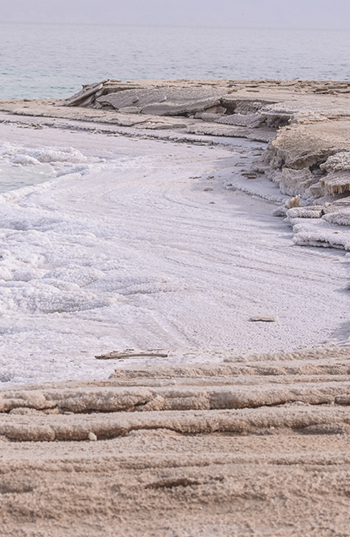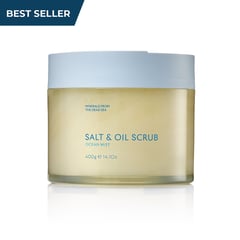
In the world of wellness and natural remedies, salts play a crucial role, offering a variety of health benefits that have been recognised for centuries. Two of the most celebrated types of salts are Dead Sea salt and Epsom salt. While both offer exceptional health and beauty benefits, understanding their unique properties and applications can help you make an informed choice.
If you've ever wondered about the difference between Dead Sea salt and Epsom salt, you're not alone. While they may look similar, these two salts offer distinct benefits due to their mineral composition and uses. As a company that prides itself on providing top-quality Dead Sea salt-based skincare products, we are excited to highlight the advantages and versatile uses of this remarkable mineral-rich ingredient, especially when compared to Epsom salt.

What is Dead Sea Salt?
Dead Sea salt is derived from the Dead Sea, which borders Jordan, Israel, and Palestine. It is known for its extremely high mineral content, with a concentration that is far richer than that of ocean water. The unique composition of Dead Sea salt includes magnesium, calcium, sulfur, bromide, iodine, sodium, zinc, and potassium.
This diverse mineral makeup is what makes Dead Sea salt particularly beneficial for skin and health treatments.
Benefits of Dead Sea Salt
Dead Sea salt is a natural powerhouse packed with minerals that support skin health and overall wellness. Before we understand how it works, let’s take a closer look at the key benefits it offers.
Skin Health
Dead Sea salt is renowned for its skincare benefits. Its high magnesium content helps to improve skin hydration and reduce inflammation. It is particularly effective in treating skin conditions such as psoriasis, eczema, and acne.
One of the most recognized Dead Sea salts benefits is its ability to detoxify and cleanse the skin which improves the overall appearance and texture. You can find these benefits in our Dead Sea Body Salt Scrub.
Therapeutic Properties
The unique mineral composition of Dead Sea salt can help to alleviate discomfort from arthritis and rheumatism. The high concentrations of bromide and magnesium can relax the muscles, ease soreness, and reduce stiffness. A study published by the International Journal of Biometeorology supports the positive effects of balneotherapy (salt baths) on joint discomfort.
Stress Relief
Soaking in a bath enriched with Dead Sea salt can help to soothe and calm the nervous system, reducing stress and preparing the body for a good night’s sleep. The bromide helps to relax both muscles and the mind. Many customers enjoy this relaxing effect with our Mineral Bath Soak.
Detoxification
Dead Sea salt has a natural ability to draw toxins out of the body, making it a great choice for a detoxifying bath. It helps to cleanse the skin’s pores deeply, promoting a fresher, more revitalised complexion.
General Well-being
Regular use of Dead Sea salt can improve blood circulation, which enhances the skin’s rejuvenation and restoration processes and helps to relax the body’s muscles and joints.
What is Epsom Salt?
Epsom salt, chemically known as magnesium sulfate, is a compound that can be used for health and beauty treatments. It is named after the town of Epsom in Surrey, England, where it was first discovered.
While it doesn’t contain the broad mineral spectrum of Dead Sea salt, Epsom salt benefits the body in many targeted ways.
What Are The Benefits of Epsom Salt?
Muscle Relaxation
Epsom salt is perhaps best known for its ability to help relax muscles and relieve pain. This is due to its high magnesium content, which is crucial for muscle function. The Cleveland Clinic supports its use for post-workout recovery and tension relief.
Stress Reduction
Magnesium is also essential for maintaining a healthy nervous system, and soaking in an Epsom salt bath can help to reduce stress and promote a sense of calm.
Exfoliation
Epsom salt can be used as a gentle exfoliant to help remove dead skin cells, improving skin texture and clarity.
Health Uses
As a natural laxative, Epsom salt can be taken internally to relieve constipation, although this should be done with caution and under medical supervision. The FDA lists magnesium sulfate as an approved treatment for occasional constipation.
Why Choose Dead Sea Salt Over Epsom Salt?
While Epsom salt has its virtues, Dead Sea salt offers a broader range of minerals that contribute to its superior therapeutic properties. For those seeking more than just magnesium relief, the difference between Dead Sea salt and Epsom salt becomes clear in their mineral diversity and skin-nourishing potential. Dead Sea salt provides a complex blend of nutrients that promote skin health, reduce inflammation, and enhance overall well-being.
So, is Dead Sea salt better than Epsom salt? For individuals looking to improve both skin condition and overall relaxation, the answer is often yes. Dead Sea salt is particularly effective for treating various skin conditions, such as psoriasis and eczema, thanks to its high levels of magnesium, bromide, and other minerals. In contrast, Epsom salt benefits are primarily centred around muscle relaxation due to its magnesium sulfate content.
Conclusion
In conclusion, while both Dead Sea salt and Epsom salt can enhance your health and beauty routines, Dead Sea salt offers a richer mineral profile and a more versatile range of benefits, especially when it comes to skincare and therapeutic uses. Our Dead Sea salt products harness these natural powers to provide a holistic approach to wellness, ensuring that you can enjoy the full spectrum of benefits that nature has to offer. Whether incorporated into bath soaks, scrubs, or other beauty and health treatments, Dead Sea salt remains a superior choice for anyone looking to elevate their natural wellness practices.
FAQs
-
What is the main difference between Dead Sea salt and Epsom salt?
Dead Sea salt has a broader range of minerals, including magnesium, calcium, and potassium, while Epsom salt primarily contains magnesium sulfate.
-
Can I use both Dead Sea salt and Epsom salt together?
Yes, but it’s best to consult with a healthcare professional if you have sensitive skin or specific health conditions.
-
Are there any side effects to using Dead Sea salt?
Dead Sea salt is generally safe for topical use, but it can irritate those with open wounds or very sensitive skin.
-
How often should I use Dead Sea salt in my bath?
2 - 3 times a week is generally safe and effective for most users.
-
Is Dead Sea salt suitable for all skin types?
Yes, but a patch test is always recommended before first-time use, especially for those with sensitive skin.

